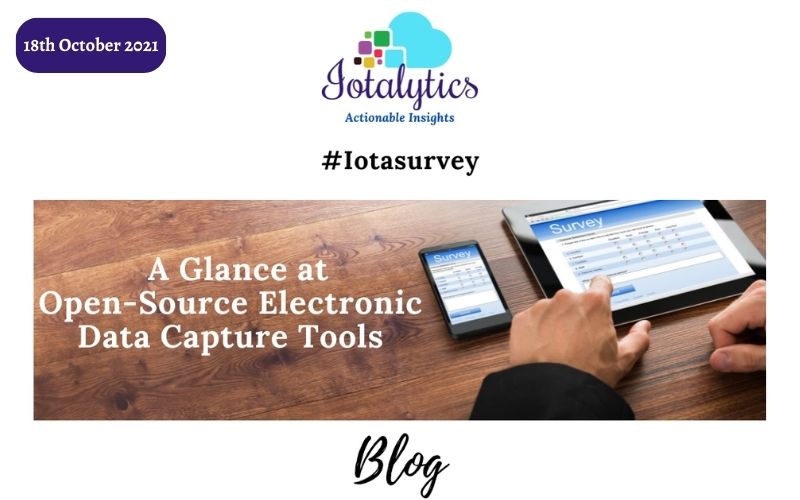
A Glance at Open-Source Electronic Data Capture Tools
September 29, 2024, IotaSurvey
Open-source software (OSS) is a type of computer software with its underlying 'source-code' made available under a license. OSS first evolved during the 1970s with Richard Stallman, who coined the term "free software" from MIT. However, the term 'free' was often misunderstood to mean 'no cost.' Hence 'open source software' was coined as a less contentious and more' business-friendly' term. Open-source development provides the potential for more malleable technology and quicker innovation. It is said to be more authentic since it typically has thousands of independent programmers testing and fixing software bugs.
Open source is not reliant on the company or author that originally created it. Even if the company fails, the code continues to exist and be developed by its users. Also, it uses open standards available to everyone; thus, it does not have the problem of irreconcilable formats that may exist in proprietary software. It is flexible because modular systems permit programmers to build custom interfaces or add new potentialities to them. It is ingenious since open-source programs are the product of collaboration among a large number of different programmers. The mix of different perspectives, corporate objectives, and personal goals speeds up innovation (1).
There are some popular Open Source Software Ever these days, like KoBo ToolBox and CSPro, Epi info, ODK, GIMP, Handbrake, Pidgin, Blender, Ubuntu etc, which we can quite easily install as per our need for free, using applications offered under the Open Software License. Below, we take a close look at some of these OSS.
Kobo Toolbox: Kobo Toolbox is a free and open-source tool that helps collect and organize field data. The Toolbox is currently used in humanitarian crisis, research, peacekeeping, economic development, etc. The software helps overcome various problems faced by professionals in the field, making data collection quicker and more reliable.
CSPro: The Census and Survey Processing System (CSPro) is a software package for entry, editing, tabulation, and dissemination of census and survey data. It combines the integrated Microcomputer Processing System (IMPS) features and the Integrated System for Survey Analysis (ISSA). CSPro is delineated to be as user-friendly and easy to use as possible, yet powerful enough to operate the most complex applications. This package is extensively used globally by statistical organizations, international agencies, NGOs, consulting companies, colleges and universities, hospitals, and private sector groups in over 160 countries (2). Major international household survey programs, for instance, Multiple Indicator Cluster Surveys (MICS) and Demographic and Health Surveys (DHS), also utilize CSPro for Census and Survey works. It works on any modern machine with Microsoft Windows and Andriod (Mobiles and Tablets). It Can export data to major statistical software formats and often is used in combination with other programs. But Only one user can write to a file at any given time, and there is no way to turn applications into internet applications.
Epi Info: Epi Info is a public domain suite of compatible software tools formulated for the global community of public health practitioners and researchers. It provides for easy data acquiring form and database construction, a modulated data entry experience, and data analyses with epidemiologic statistics, maps, and graphs for public health professionals who may have an insufficient information technology background. Epi Info is utilized for outbreak interrogations; for evolving small to mid-sized disease surveillance systems; as analysis, visualization, and reporting (AVR) components of larger systems, and in the ongoing education in the science of epidemiology and public health coherent methods at schools of public health around the globe.
From a user's viewpoint, the essential functions of Epi Info are the ability to quickly develop a questionnaire, modify the data entry process, quickly enter data into that questionnaire, and then analyze the data. For epidemiological uses, such as outbreak investigations, being able to rapidly produce an electronic data entry screen and then do expeditious analysis on the collected data can save considerable amounts of time versus using paper surveys.
ODK: ODK is open-source software for collecting, managing, and using data in resource-constrained environments (3). It permits for offline data collection with mobile devices in remote areas. ODK can be applied when a community desires to collect data with full control over the collected data. Collected data can be stored offline on a mobile device. The collection and accumulation of data from the devices can be performed with Open Source tools according to the community's privacy concerns. The community members must be capable of checking the source code of the client and server application for undesirable features and respect for privacy concerns. Furthermore, suppose the community wants to have full administrations rights for the server backend. In that case, the ODK infrastructure can be set up according to these compulsion and restraints for the privacy concerns of the community. Because ODK permits the data collection in resource-constrained environments, ODK is intended to be applied for underserved populations and recognize their needs and community-driven innovation based on the aggregate data (4).
References
1. Plotkin, H. (1998). What (and why) you should know about open source software. Harvard Management Update, 12, 3-4.
2. "Archived copy". Archived from the original on 2017-12-01. Retrieved 2017-11-22
3. Benchmarking of Mobile Data Collection Solutions - What aspects to consider when choosing a tool/platform Terre des Hommes, CartONG, UNHCR, (2017). Available from:
http://blog.cartong.org/wordpress/wpcontent/uploads/2017/08/Benchmarking_MDC_2017_CartONG_2.pdf
4. Hartung et. al. (2010) Open Data Kit: Tools to Build Information Services for Developing Regions. Available from:
http://www.nixdell.com/classes/Tech-for-the underserved/Hartung.pdf
Contributors:
Jhumki Kundu, Ajit Kumar Jaiswal, Prabhu Ponnusamy
